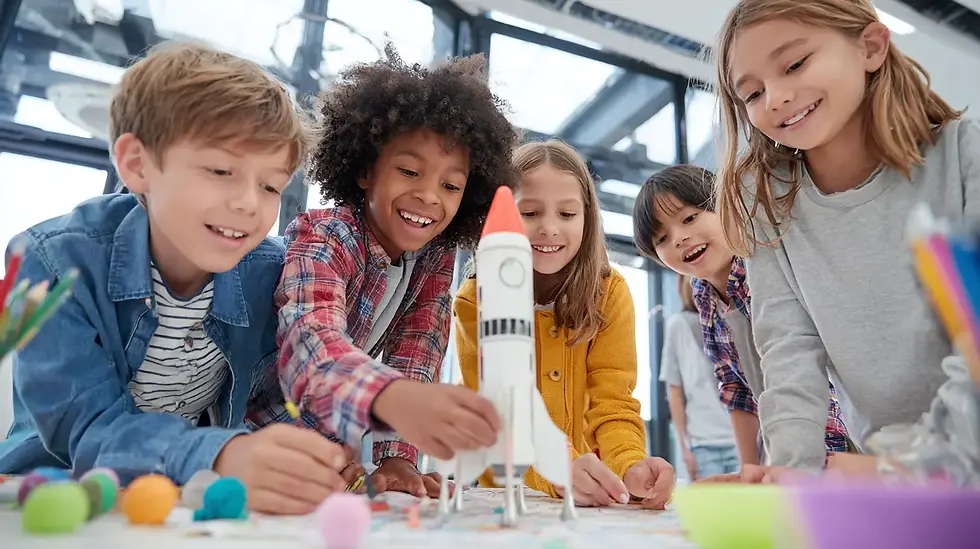Rethinking Primary Education: Why Teaching Skills—Not Just Subjects—Should Be the Focus
- gamerschool0
- Jul 17, 2025
- 3 min read
The traditional primary school curriculum has long been a patchwork of subjects—music, art, history, geography, foreign languages—each allotted its slot in a weekly timetable. But for all its breadth, this model is increasingly being criticised as shallow and outdated. In an age of rapid change and complex challenges, do we really prepare children for the future by having them memorise facts for tests?

At Gamer School, we believe it’s time to flip the script.
Rather than teaching subjects, we should be teaching skills—critical thinking, problem-solving, creativity, collaboration, digital literacy, and above all, a love for learning. These are the tools children need to thrive in tomorrow’s world.
From Content to Competence
A skills-based curriculum doesn't discard knowledge—it deepens it. Instead of skimming across dozens of topics, pupils explore fewer themes in greater depth, guided by real-world problems and engaging challenges.
Take science and maths. Instead of drilling equations, pupils might engineer a water filter, model a rocket launch, or simulate a pandemic response—building problem-solving and analytical skills along the way. Learning becomes active, not passive.
History and geography aren’t about memorising dates or labelling maps—they're opportunities to investigate why events happened, how societies rose or fell, and what shapes our world. Pupils can debate, model, and even roleplay past dilemmas, sharpening critical thinking and empathy.
Even French or other languages become more meaningful when taught through conversation, storytelling, and real-world immersion, rather than grammar worksheets.
More Than Academics—A Love for Learning
The point isn’t to erase traditional subjects—but to reframe them. Music, art, languages, and humanities are powerful vehicles for building creativity, communication, and cultural awareness. But they shouldn't be ends in themselves.
Instead of “history on Monday” and “art on Thursday,” imagine this:
Monday afternoons: Critical Thinking—where a historical mystery or ethical debate sparks deep inquiry.
Tuesdays: Creativity—pupils choose between composing music, designing a game, or making stop-motion animations.
Wednesdays: Collaboration—building something together, solving a shared puzzle, or planning a student-led project.
Fridays: Reflection & Goal Setting—what did I learn this week, and how did I learn it?
Learning becomes interdisciplinary, learner-led, and purpose-driven.

What the Research Says
This isn’t just philosophy—it’s backed by evidence. The World Economic Forum lists critical thinking, creativity, and problem-solving among the top skills needed for the 2025 workforce. The OECD has found that students who enjoy learning and feel a sense of agency perform better academically and are more likely to thrive later in life.
A Timetable for the Future
The future doesn’t care whether a child can name the capital of Peru—it cares whether they can solve problems, communicate clearly, and adapt to change. In a reimagined timetable, we don’t abandon traditional knowledge—we embed it in rich, meaningful contexts.
Children won’t just “do geography.” They’ll explore how cities are planned, why some communities thrive while others fail, and how we might build a better future. They won’t just “do music”—they’ll use sound to tell stories, share emotions, and connect with others.
Conclusion: Time to Let Go of the Past
The world has changed. Education must too.
The old model—broad but shallow, structured around subjects—no longer serves the needs of children growing up in an unpredictable, AI-driven, globalised world. A skills-first curriculum doesn't sacrifice rigour; it demands it. It prepares students not just to pass exams, but to learn how to learn, think for themselves, and shape their own futures.
This is the path to a more joyful, resilient, and meaningful education.
It’s time to stop asking, “What subject are we teaching today?”And start asking, “What skill are we building—and why does it matter?”





Comments